As four people are charged over the collapse of the Patisserie Holdings business, we examine how Patisserie Valerie recovered and rebuilt.
On the morning of 10 October 2018, Patisserie Valerie owner Patisserie Holdings announced it was investigating “significant, and potentially fraudulent, accounting irregularities”.
It was the start of a calamitous period for the business that would see dozens of shops close, hundreds of jobs lost and – as of last week – four people charged by the Serious Fraud Office.
And yet, five years since the disaster that almost broke the business, Patisserie Valerie remains a presence on many high streets and could even be described as flourishing under its current ownership.
As Patisserie Valerie’s owners told British Baker this week: “The strength of the Patisserie Valerie brand and demand for its lovingly handmade cakes and gateaux has endured, despite the financial mess that was left behind and challenges of Covid-19 which followed shortly thereafter.”
So, how did a business that once operated around 200 sites come close to disappearing, and how was it brought back from the brink to become an omni-channel business?
Just six months before news of the accounting issues broke, Patisserie Holdings appeared to be in rude health. A half-year trading update had announced strong growth in profits and sales, and that the business was on track to open 20 new sites that year.
But within 24 hours of the 10 October announcement came the incredible news that Patisserie Holdings would be unable to continue trading unless it had an immediate cash injection of around £20m. (Accountancy firm Grant Thornton would later be fined £2.3m over audits of the business carried out for the financial years ended 30 September 2015, 2016 and 2017. The Financial Reporting Council said Grant Thornton had missed ‘red flags’.)
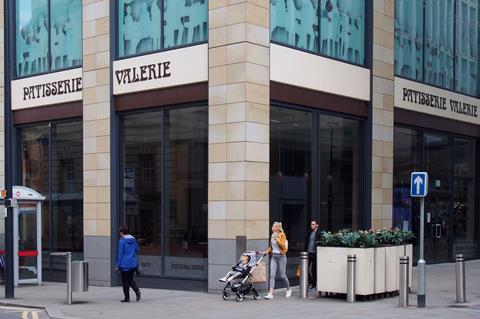
At that time Patisserie Holdings was operating more than 150 Patisserie Valerie sites and around 50 sites under other brands, employing more than 3,000 people.
“The board has reached the conclusion that there is a material shortfall between the reported financial status and the current financial status of the business,” it stated on 11 October 2018.
Within days, a share offer had raised £15.7m, and chairman Luke Johnson agreed to loan the business up to £20m. Patisserie Holdings said this would enable the business to continue trading in its current form.
But just three months later, Patisserie Holdings entered administration after being unable to renew its banking facilities. Administrator KPMG immediately closed around 70 sites, stating it would continue to trade from 121 stores while looking at options for the business, including a sale as a going concern.
In February 2019, came the news that the Patisserie Valerie business, comprising 96 sites, was being acquired by Irish private equity firm Causeway Capital, which was backing a management buyout. Causeway Capital was no stranger to the market, having also invested in Bakers & Baristas, the bakery and coffee chain with 60 sites across the UK and Ireland.
This was not the end of store closures, however, and the new owners shut 14 shops that summer.
In March 2020, Causeway Capital announced that Patisserie Valerie would be merging with Bakers & Baristas to create a combined operation with 125 sites. The new group, which continues operating under its individual brands, is led by Bakers & Baristas CEO James Fleming.
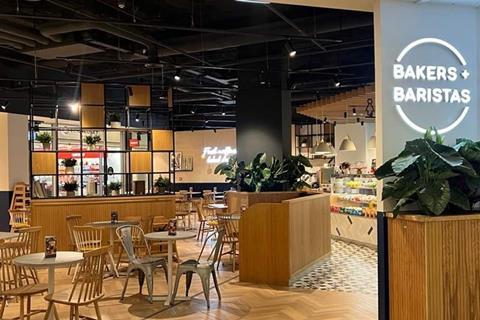
Just days later came the last thing a cafe chain needed – the start of a series of national lockdowns as Covid-19 took grip.
Like many bakery businesses, Patisserie Valerie launched a click and collect service during the pandemic. It made its debut in 42 sites in September 2020 ahead of a wider rollout across the estate.
Direct-to-consumer delivery would go on to become a core element of the ‘new’ Patisserie Valerie. In March last year, it unveiled the Signature Collection of premium cakes as it looked to take a larger slice of the celebration cake market. The range launched with seven products priced from £75 to £85.
The business this week told British Baker it now serves more than 100,000 online customers a year. It has also been named as a finalist in the Online Bakery of the Year category at the upcoming Baking Industry Awards 2023.
As Katherine Prowse, senior insight manager at Lumina Intelligence puts it: “The brand’s core strengths lie in occasion cakes from weddings to birthdays, and new flavour offerings including chocolate orange and Lotus Biscoff are aiding the brand to widen its appeal.”
The business has also ramped up its activity with Sainsbury’s, launching a new partnership in late 2020 that saw a phased rollout of a selection of its cakes and pastries to 250 of the retailer’s stores. This wholesale partnership has since been expanded to 400 Sainsbury’s.
Ultimately, Covid would take a heavy toll on the Patisserie Valerie brand, with the closure of further sites as some failed to recover following the pandemic.
Today, the Patisserie Valerie estate stands at 30 shops. Although this is a far cry from the 150 that carried the name in 2018, Causeway Capital seems committed to them and has just announced an investment programme that is due to revamp 10 sites by the end of this year.
“The aim is to brighten the look and feel of our patisseries, bringing them up to date while preserving the heritage and friendly atmosphere Patisserie Valerie is famous for.” the business stated, adding that the first patisseries to be refurbished are in Wimbledon, Cambridge and Winchester.

Prowse at Lumina believes store revamps are crucial for attracting footfall as high street and city centre traffic continues to recover following the pandemic.
“Patisserie Valerie is bouncing back through careful store re-vamps and focusing on its core offer of handmade cakes,” she says. “The brand’s newer services including onsite afternoon teas are tapping into a consumer trend for affordable treats as the cost-of-living crisis continues to bite. Consumers are seeking out experience-led treats that do not break the bank.”
It is a view echoed by Simon Stenning, strategic advisor at Future Foodservice, which estimates the market segment it has labelled Dessert Cafes, in which Patisserie Valerie sits, is set to grow 2.9% in outlet numbers and 3.4% in value in 2023, and 2% and 3% respectively in 2024.
“These forecasts are to outperform some other segments of the market as consumer demand for indulgent treats continues to grow and as they remain affordable,” he explains.
Little wonder then that Causeway has said the business is on track to return to opening new sites “well ahead” of its centenary in 2026.
Comments made by Serious Fraud Office director Lisa Osofsky, on the day four people were charged in relation to the accounting issues, serve as a reminder of just how far Patisserie Valerie has come: “Patisserie Valerie’s abrupt collapse rocked our high streets, leaving boarded-up shops, devastating job losses, and significant investor losses in its wake. Today is a step forward in getting to the bottom of this scandal.”
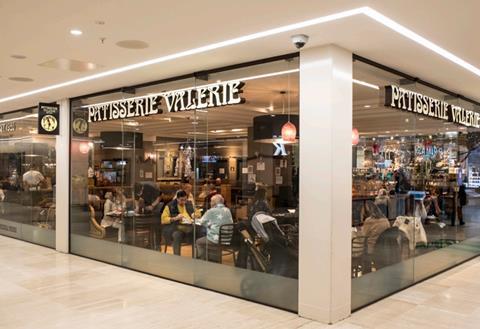
Patisserie Valerie – a timeline
1926: First Patisserie Valerie café opens in Frith Street in London’s Soho by Madame Valerie to introduce Continental-style patisserie to the English
1939-1945: Café is destroyed by bombing in Second World War, and Madame Valerie opens new Patisserie Valerie on nearby Old Compton Street
1945-2005: Patisserie Valerie grows to eight sites in central London
2006: Luke Johnson’s private equity firm Risk Capital Partners backs acquisition of Patisserie Valerie by Patisserie Holdings
2017: Launches trial partnership with Sainsbury’s, selling branded products on 12 supermarket counters
October 2018: Share trading in Patisserie Holdings is suspended on 10 October as company launches investigation into serious accounting irregularities. Patisserie Holdings reports it cannot continue to trade in its current form without immediate cash injection, with a share offer raising £15.7m and chairman Luke Johnson providing up to £20m in loans
January 2019: Patisserie Holdings enters administration after failing to secure financing, with 70 sites closing immediately
February 2019: Patisserie Valerie is acquired by Dublin-based private equity firm Causeway Capital
March 2020: Patisserie Valerie merges with Causeway Capital-owned Bakers & Baristas
September 2020: Patisserie Valerie rolls out click & collect service
November 2020: Start of wholesaler supply deal with Sainsbury’s that has since extended to 400 stores
March 2022: Patisserie Valerie unveils luxury celebration cake range
September 2023: Four people are charged with fraud over Patisserie Valerie collapse



















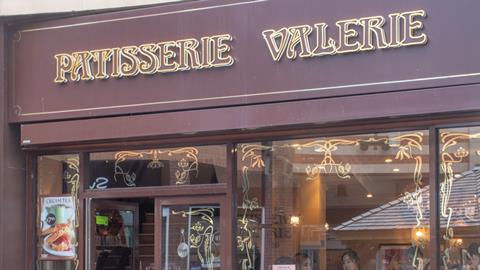
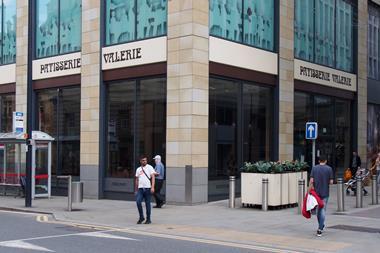

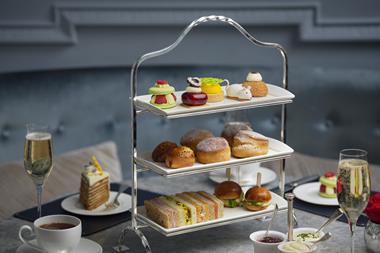



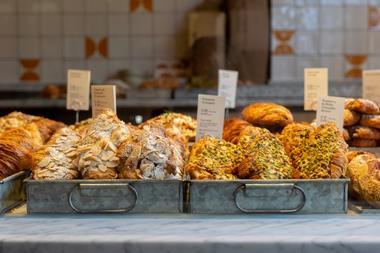
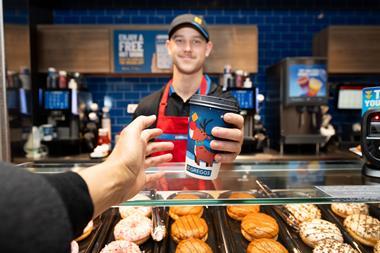
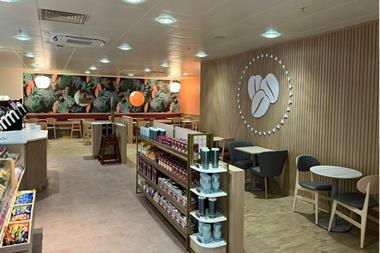


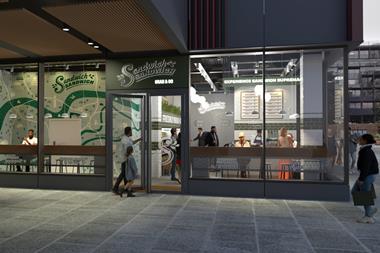

No comments yet